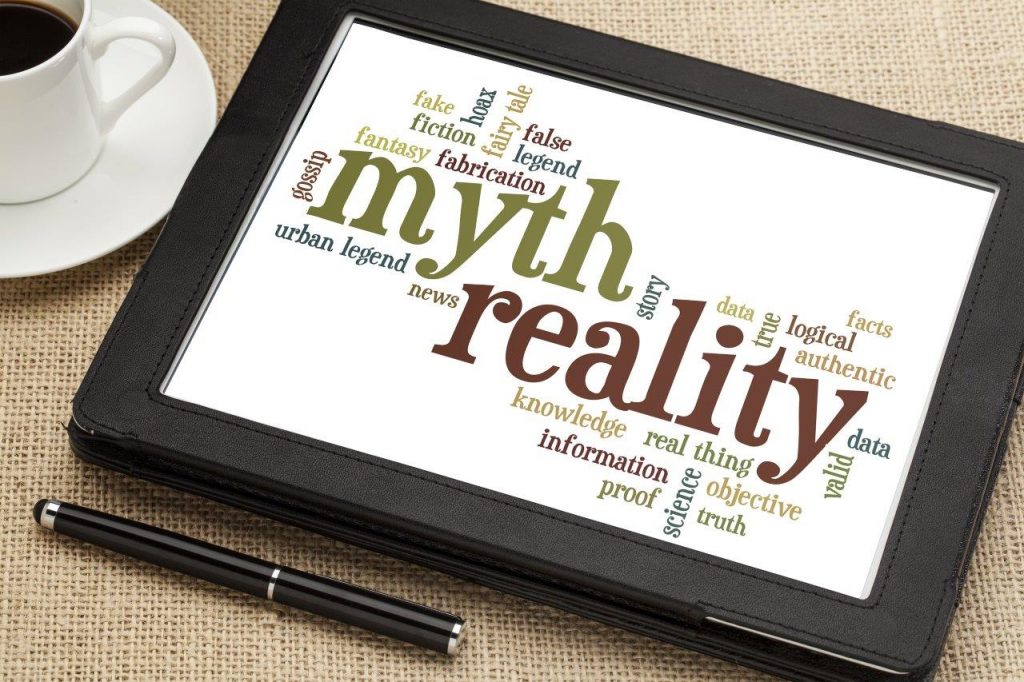Busting 7 Popular Credit Score Myths


Your credit score is complex, but having a better basic understanding about how it really works can help you to improve your credit report. While there’s more credit score information available than ever before, many potential home buyers continue to have misconceptions about credit scores that can actually hurt them. Here are seven common credit score myths, that once you understand them, can help you take the right steps to raise your credit score… and avoid hurting it.
Credit Score Myth Busting
Myth #1: I believe I have good credit.
Busted: This one always gets me. Many potential home buyers tell me they “have good credit.” But believing and knowing are two different things and you can’t just assume your credit score is OK. Just because you had a credit score that was good enough to buy your last car doesn’t mean you have the credit score you need to get a construction loan to build a new home. Make sure to get copies of your free annual credit report from all three major credit reporting agencies every year, review the report and also periodically check your credit scores.
If you get your credit report and find errors, dispute them immediately. Disputes take time to process but you want to start the process as soon as you identify a mistake. If you find some bad marks and they do belong to you, you can rebuild credit over time with patience and good debt management. Consistently making on-time payments is the first step towards improving your score.
Myth #2: Checking your credit can hurt your credit score.
Busted: Pulling your own credit report doesn’t affect your credit score. This is known as a soft inquiry and it is actually a good practice to frequently check your credit score and overall credit status. There are websites, such as CreditKarma.com, that let you do it for free. Many credit card companies are now even providing you with a view of your credit score as a free additional service.
Keep in mind that if a lender pulls your score it is a “hard inquiry“. Hard inquiries can lower your credit score. Examples of when this can happen is when you shop for a car and multiple lenders pull your score for the same purchase. You typically have to authorize lenders to process a request that leads to a hard inquiry.
Regularly checking your score is a good idea. If you see a big drop and you didn’t apply for credit recently, that should be a red flag that maybe someone else did in your name.
Myth #3: Closing old accounts can boost your credit score.
 Busted: This can actually hurt you more than you think. By closing an account it lowers your available credit. Because so much of your credit score is made up of ratios, decreasing your available amount of unused credit will actually raise your debt-to-credit ratio, thereby lowering your credit score. This can be especially detrimental if you carry balances on other cards.
Busted: This can actually hurt you more than you think. By closing an account it lowers your available credit. Because so much of your credit score is made up of ratios, decreasing your available amount of unused credit will actually raise your debt-to-credit ratio, thereby lowering your credit score. This can be especially detrimental if you carry balances on other cards.
In addition to raising your debt-to-credit ratio, the age of your credit accounts plays a big role in establishing your FICO or VantageScore credit score. If you happen to close one of your older accounts you could also see a hit to your credit score because of it.
Myth #4: My income affects my credit score.
Busted: Many people think that their income impacts their score. I am surprised at how many people believe that their low income has hurt their credit. The only way your income can hurt your credit is if you don’t make enough money to pay your bills (and pay them on time). Just remember that your income is not listed on your credit reports and it isn’t a factor in determining your credit score.
It’s also important to know that age is not a factor either, nor is your race, religion, receipt of government assistance, or other non-debt-related factors. These things just simply don’t matter to the credit models of the companies that create credit scores.
RELATED: GETTING A HOME MORTGAGE: THE TEN COMMANDMENTS
Myth #5: Married couples have just one credit score.
Busted: It’s a common misconception that married couples are essentially treated as one person for credit scoring. This isn’t true. You and your spouse will continue to maintain separate credit histories and credit scores after you get married. If you have joint accounts then any credit information related to only those accounts will affect both of your credit scores. Accounts that are individually held will only impact that account holder’s credit score.
However, what usually happens is that the spouse who has bad credit usually has the higher income. The other spouse has a great credit score but can’t afford to purchase the home based on their income only. To qualify for a large loan like a mortgage, typically the credit of both individual spouses will need to be considered. That is unless one spouse can afford the house on their own and doesn’t need the income of the other spouse to qualify.
Myth #6: Paying cash is the best thing you can do for your credit score.
 Busted: Having a good credit score means you have a solid credit history. You can’t build a solid credit history without actually demonstrating that you know how to use and manage credit. It is a popular misconception that avoiding the use of credit cards is a good credit move. If you have other methods of demonstrating creditworthiness, such as a mortgage and car loans, then you can still have a good score.
Busted: Having a good credit score means you have a solid credit history. You can’t build a solid credit history without actually demonstrating that you know how to use and manage credit. It is a popular misconception that avoiding the use of credit cards is a good credit move. If you have other methods of demonstrating creditworthiness, such as a mortgage and car loans, then you can still have a good score.
Just keep in mind that 10% of your score comes from your credit mix. This is the combination of the types of credit you have: mortgages, revolving accounts, and installment loans. Having one or more of each in your credit profile can actually show that you know how to use and manage you credit which will increase your credit score. If you don’t have any open revolving credit lines (credit cards), then this category can’t contribute to raising your score
Myth #7: It’s impossible to get a credit card if you don’t have any credit
Busted: Without a credit score it can be difficult to get a credit card. When you are just starting out, your credit report must have at least one account opened for six months or more and at least one account that has been reported to a credit bureau within the past six months in order to even have a FICO credit score. If you can’t meet both of these requirements then you won’t have a FICO score.
If you are having difficulty you can apply for a credit card or loan with a cosigner or even become an authorized user on someone else’s account. If you don’t have those options then you can get a secured credit card on your own. The key is to find an option and get started building a good credit score.
Credit Score Requirements: Used Home versus New Construction Mortgage
Just remember that to get a construction loan you will need to have a better credit score than is needed for a mortgage to buy an existing home (new or used). This is because the bank is taking more risk. What happens of you fail to make payments while your modular home is being built and the bank has to foreclose. Not something you want think about but the bank has to address it.
They mitigate this risk by making sure home buyers that want to build a new home are better credit bets than the average home buyer. They cover this risk by requiring higher credit scores and sometime requiring more money down or more cash reserves. Getting a construction loan to build a new home means you have to be a good bet for the bank. By busting the myths surrounding credit scores you know have the information you need to present the best credit picture to the lender when it comes time to get the construction loan to build your new home!
The post Busting 7 Popular Credit Score Myths appeared first on Impresa Modular.




